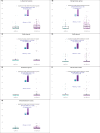Role of aspirin on colorectal cancer risk and bacterial translocation to bloodstream
- PMID: 40153368
- PMCID: PMC11952268
- DOI: 10.1371/journal.pone.0319750
Role of aspirin on colorectal cancer risk and bacterial translocation to bloodstream
Abstract
An involvement of gut microbiota on the possible role of aspirin against intestinal adenoma (IA) and colorectal cancer (CRC) has been suggested. To further investigate this issue, we analyzed data from an Italian case-control study including 100 incident histologically confirmed CRC cases, as well as 100 IA and 100 controls without lesions from colonoscopy, matched to cases by center, sex and age. Serum zonulin was assessed by ELISA kit and blood bacterial DNA by qPCR and 16S rRNA gene profiling. Fifty-eight subjects (19.3%) reported aspirin use of ≥ 100 mg/day for cardiovascular prevention for at least six months. To evaluate the relationship between aspirin and IA and CRC risks, the odds ratios (OR) of IA and CRC and the corresponding 95% confidence intervals (CI) for aspirin use were estimated using a logistic regression model conditioned on the matching variable and adjusted for education and a model adjusted for several potential confounders including BMI and cardiovascular diseases. We evaluated whether the levels of zonulin and bacterial DNA data were different in aspirin users vs non-users through the rank sum and chi-square tests. Aspirin use was associated with a reduced risk of IA (OR = 0.45, 95% CI = 0.21-0.94) and CRC (OR = 0.43, 95% CI = 0.19-0.96). Similar results were obtained using the fully adjusted model. We found lower genera and operational taxonomic units (OTUs) richness of blood bacterial community in aspirin users vs non-users overall and in cases and controls. The genera Cutibacterium, Sphingomonas, Gaiella, Delftia and Romboutsia, order Microtrichales and class Deltaproteobacteria were different according to aspirin use. This study provides additional data on the favorable role of aspirin on IA and CRC risks and supports the hypothesis of an involvement of intestinal bacterial translocation to the bloodstream.
Copyright: © 2025 Mignozzi et al. This is an open access article distributed under the terms of the Creative Commons Attribution License, which permits unrestricted use, distribution, and reproduction in any medium, provided the original author and source are credited.
Conflict of interest statement
The authors have declared that no competing interests exist.
Figures

References
-
- Bosetti C, Santucci C, Gallus S, Martinetti M, La Vecchia C. Aspirin and the risk of colorectal and other digestive tract cancers: an updated meta-analysis through 2019. Ann Oncol. 2020;31(5):558–68. - PubMed
-
- Bailie L, Loughrey MB, Coleman HG. Lifestyle risk factors for serrated colorectal polyps: a systematic review and meta-analysis. Gastroenterology. 2017;152(1):92–104. - PubMed
-
- Guillem-Llobat P, Dovizio M, Alberti S, Bruno A, Patrignani P. Platelets, cyclooxygenases, and colon cancer. Sem Oncol. 2014;41(3):385–96. - PubMed

